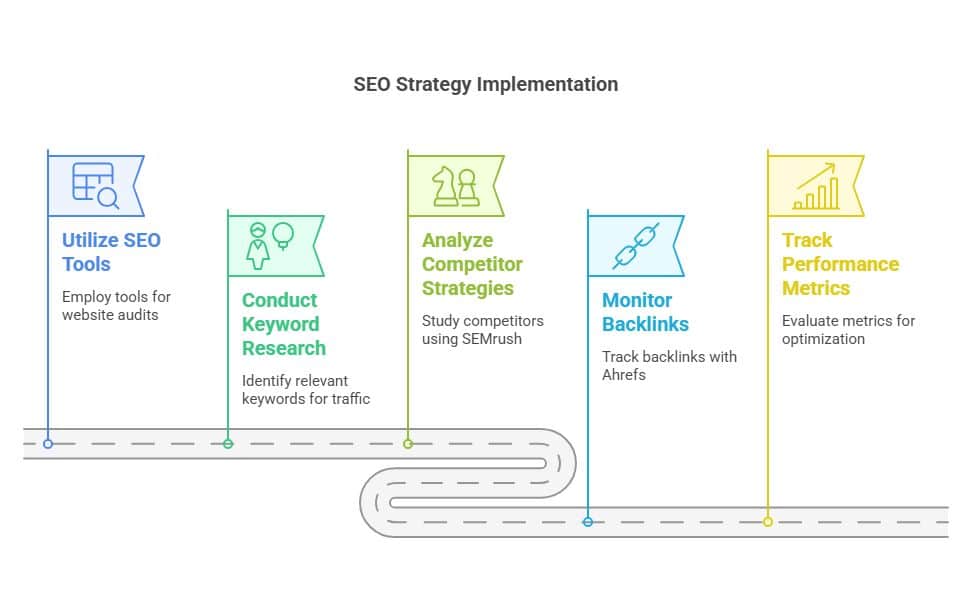
Becoming skilled at enhancing websites for better performance requires employing leading tools designed for search engine optimization. These tools help increase a site’s visibility online ultimately driving more visitors to the website.Tools like SEMrush and Ahrefs facilitate comprehensive competitor analysis and enable detailed backlink monitoring. Additionally, keyword research aids in selecting effective search terms to drive engagement, while site audit techniques optimize technical SEO elements and user experience. Enhancing on-page SEO by refining meta tags and internal linking solidifies search rankings. As trends evolve, the integration of AI and machine learning in SEO tools promises even more sophisticated data analysis and insights. Gain further expertise and refine these strategies with deeper exploration.
Key Takeaways
- Utilize SEO tools for comprehensive website audits to enhance search engine performance.
- Conduct keyword research to drive targeted traffic and improve website engagement.
- Analyze competitor strategies with tools like SEMrush for strategic SEO insights.
- Monitor backlinks using Ahrefs to maintain website credibility and authority.
- Track performance metrics like organic traffic and keyword rankings for data-driven optimization.

Understanding SEO Tools

When exploring the internet grasping SEO tools is vital for boosting online presence and attracting visitors to websites. These tools are indispensable for implementing effective search engine optimization (SEO) strategies, which aim to enhance website performance and ensure a site ranks well in search engine results. SEO tools help businesses understand their website’s position. They show areas that need work. With this information businesses can make smart choices to improve their SEO.
SEO tools serve various functions that contribute to a comprehensive SEO strategy. They can perform website audits, analyze backlinks, and monitor website performance metrics, such as page speed and mobile compatibility. These tools provide valuable data that help webmasters understand how search engines perceive their websites and what changes are necessary to improve ranking.
Furthermore, SEO tools facilitate competitor analysis, allowing businesses to benchmark their performance against industry rivals and adapt their strategies accordingly.
An essential component of SEO tools is the ability to perform keyword research, which identifies the search terms most relevant to a business’s content and target audience. However, beyond keyword research, SEO tools help optimize on-page elements—such as meta tags, headers, and content structure—and track the effectiveness of these changes over time.
Employing the right set of SEO tools enables businesses to stay agile in an ever-evolving digital environment, ensuring their online presence is optimized for both search engines and user experience. Ultimately, understanding and utilizing these tools is a foundational step towards achieving sustained success in digital marketing.
Keyword Research Essentials

In the realm of SEO, mastering keyword research is a pivotal step towards achieving optimal search engine rankings and driving targeted traffic to your website. Keyword research essentials form the backbone of any successful SEO strategy, ensuring that your content aligns with what users are actively searching for.
By employing the right SEO tools, you can efficiently identify high-impact keywords that enhance your search engine visibility, ultimately optimizing your website’s performance.
To effectively conduct keyword research, consider these key aspects:
- Identify Relevant Keywords: Use SEO tools like Google Keyword Planner, SEMrush, or Ahrefs to discover keywords with significant search volume pertinent to your niche. This involves finding terms that your target audience frequently uses when searching for products or services like yours.
- Analyze Search Volume and Competition: Understanding search volume is crucial to gauge the potential traffic a keyword can drive to your site. Additionally, evaluating competition levels helps in identifying keywords that can realistically improve your search engine visibility without excessive competition.
- Focus on Long-Tail Keywords: Long-tail keywords, though having lower search volumes, often bring higher conversion rates due to their specificity. Incorporating these can enhance your content’s relevance and attract more qualified leads by addressing precise user queries.
Analyzing Competitor Strategies

Understanding competitor strategies is a crucial component of an effective SEO plan, offering insights into what works within your industry and where there might be opportunities for differentiation. By analyzing competitor strategies, businesses can identify the strengths and weaknesses of their rivals and adapt their own plans to enhance their SEO performance.
The use of advanced SEO tools is fundamental in this process, providing the means to systematically evaluate competitors’ approaches and improve search engine rankings.
Several SEO tools stand out for their ability to dissect competitor strategies effectively. Tools like SEMrush, Ahrefs, and Moz allow businesses to conduct comprehensive analyses of competitors’ keywords, backlink profiles, and traffic sources.
These insights reveal not only the strategies competitors employ but also highlight areas for improvement in your own SEO endeavors. For instance, understanding which keywords drive traffic to competitors’ sites can inform your keyword strategy, helping you to target high-value terms that may have been overlooked.
Moreover, assessing backlink profiles with SEO tools can uncover potential link-building opportunities. By identifying high-authority sites linking to your competitors, you can pursue similar connections, thereby strengthening your own site’s authority.
Additionally, these tools can help monitor changes in competitors’ search engine rankings over time, offering a dynamic view of their SEO performance and adjustments.
Site Audit Techniques
How can businesses ensure their websites are optimized for peak performance in search engines? The answer lies in the meticulous application of site audit techniques. Conducting an SEO audit is essential for identifying areas where a website can be improved to enhance search engine performance.
A comprehensive audit evaluates technical SEO elements, content quality, and user experience. This diagnostic process is crucial in optimizing your website for better visibility and ranking.
A well-executed SEO audit involves several steps to ensure a thorough examination of a website’s health. Here are three critical components to focus on when assessing your website:
- Technical SEO Elements: Start by analyzing the foundational structure of your website. This includes checking for crawl errors, ensuring the site is mobile-friendly, and reviewing page speed.
Technical SEO is pivotal in ensuring that search engines can access and understand your content effectively.
- Content Evaluation: Review the quality and relevance of the content on your site. This involves checking for duplicate content, optimizing meta tags, and ensuring that your content aligns with user intent.
High-quality content is a key driver of search engine performance.
- User Experience and Design: Assess the overall user experience by evaluating site navigation, layout, and accessibility. A well-designed website not only retains users but also signals to search engines that your site is authoritative and trustworthy.
Backlink Monitoring Methods

Backlinks serve as the backbone of any successful SEO strategy, acting as endorsements that boost a website’s credibility and authority in the eyes of search engines. Monitoring these backlinks is essential for maintaining and enhancing the effectiveness of your SEO efforts.
Employing sophisticated backlink monitoring methods is crucial to ensuring that your website remains in good standing and continues to attract quality website traffic.
One of the primary SEO tools employed for backlink monitoring is Ahrefs, which provides comprehensive insights into the quality and quantity of backlinks. It helps identify new links, track lost ones, and analyze the overall health of your backlink profile. Such insights are valuable for adapting to search engine algorithms that prioritize the relevance and authority of linking sites.
Another effective tool is SEMrush, which offers a robust backlink audit feature. This feature helps you assess the potential risks associated with certain backlinks and identify toxic links that could harm your search rankings. By adhering to SEO best practices, you can ensure that your backlink strategy aligns with the ever-evolving criteria set by search engine algorithms.
Moreover, Google Search Console remains an indispensable resource in backlink monitoring methods. It allows webmasters to see which sites link to theirs, providing a clear picture of their backlink landscape. This direct insight from Google helps in maintaining a clean link profile and recognizing opportunities to further drive website traffic.
Incorporating these SEO tools into your backlink monitoring strategy ensures a proactive approach to managing your website’s visibility and trustworthiness, ultimately contributing to sustained success in search engine rankings.
Tracking Performance Metrics

In the realm of SEO, effectively tracking performance metrics is paramount for measuring the success and efficiency of your optimization strategies. Monitoring these metrics enables you to gauge how well your website is performing in search engine results and to identify areas that require improvement.
By employing the right SEO tools, you can obtain valuable insights that guide your decision-making process and help enhance your search ranking.
To streamline this process, consider the following key metrics:
- Organic Traffic: This metric reflects the number of visitors arriving at your website through search engines. An increase in organic traffic usually indicates successful optimization efforts and improved visibility in search engine results.
- Keyword Rankings: Monitoring keyword rankings is crucial for understanding how your website fares in terms of specific search queries. SEO tools can provide you with reports on keyword performance, helping you focus on optimizing the terms that drive the most traffic and conversions.
- Bounce Rate: This metric measures the percentage of visitors who leave your website after viewing only one page. A high bounce rate may suggest issues with page content or user experience, necessitating adjustments to improve engagement and lower bounce rates.
Utilizing sophisticated SEO tools for tracking performance metrics ensures you stay informed about your website’s health and optimization success.
These insights allow you to make data-driven decisions, refine your strategies, and ultimately improve your search ranking. Remember, consistent monitoring and analysis are key to maintaining and enhancing your website’s performance in the ever-evolving digital landscape.
Enhancing On-Page SEO

Building upon the insights gained from tracking performance metrics, enhancing on-page SEO becomes a strategic next step in optimizing your website for search engines. On-page SEO focuses on refining the elements within your website that contribute to higher search engine rankings. By meticulously addressing these components, you ensure that search engines use bots can effectively crawl and understand your website’s content, thereby improving visibility and user engagement.
Central to on-page SEO is the optimization of your website’s content. This involves the strategic use of keywords, ensuring they are relevant and naturally integrated into your text. SEO tools can assist in identifying the most effective keywords for your target audience, enhancing your content’s relevance and reach. Moreover, these tools help in analyzing keyword density and placement, ensuring that your content remains both reader-friendly and algorithmically appealing.
Another critical aspect is the optimization of meta tags, including title tags and meta descriptions. These elements serve as the first touchpoint with potential visitors on search engine results pages. Crafting compelling and informative tags can significantly boost click-through rates, drawing more traffic to your site.
Additionally, ensuring proper header tag hierarchy within your pages enhances readability and structure, making it easier for both users and search engines to navigate your content.
Internal linking, meanwhile, strengthens site architecture, guiding visitors to related content and distributing link equity across pages.
Technical SEO Insights
Delving into the realm of technical SEO, you’ll uncover how crucial it is in ensuring that your website not only meets but exceeds the standards set by search engines.
Technical SEO involves optimizing your website’s infrastructure to facilitate seamless interaction with search engine bots. This is essential for improving rankings and maximizing visibility. By leveraging technical SEO insights and utilizing advanced SEO tools, you can enhance website speed, an integral factor that influences both user experience and search engine rankings.
The importance of technical SEO cannot be overstated. Here are three pivotal components to consider:
- Website Speed: Fast-loading pages are favored by search engines. Tools like Google PageSpeed Insights can help you identify areas to improve, ensuring that users and search engine bots encounter minimal delays.
- Crawlability and Indexability: Ensuring that search engine bots can easily navigate and index your site is critical. Tools such as Screaming Frog SEO Spider can audit your site’s structure, revealing potential barriers to bot access and suggesting ways to enhance crawlability.
- Mobile Friendliness: With an increasing number of users accessing websites via mobile devices, optimizing your website for mobile is non-negotiable. Google’s Mobile-Friendly Test tool can provide insights into how well your site performs on mobile devices, highlighting areas that require attention.
Incorporating these technical SEO insights will significantly aid in optimizing your website, ensuring it is both user-friendly and search engine-friendly.
Local SEO Optimization

Often overlooked yet fundamentally vital, local SEO optimization plays a crucial role in driving geographically relevant traffic to your website. By focusing on local SEO, businesses can effectively connect with potential customers in their immediate vicinity, enhancing visibility and engagement within local markets. This approach is particularly significant for small and medium enterprises that rely heavily on community support and foot traffic.
A key component of local SEO is managing your Google My Business listing. This tool allows businesses to appear in local search results, providing essential information such as address, phone number, and operating hours directly within search engines. Ensuring that your Google My Business profile is complete, accurate, and frequently updated is critical to optimizing your website for local search queries. This not only improves your ranking but also builds trust with prospective clients who seek reliable information.
On-page SEO involves optimizing various elements of your website to enhance local search performance. This includes strategically incorporating location-specific keywords within your content, meta tags, and headers. Such practices signal to search engines that your website is relevant to users searching within a particular geographic area.
Additionally, ensuring your website is mobile-friendly and loads quickly is essential, as many users searching for local businesses do so on mobile devices. Search engines prioritize websites that offer a seamless mobile experience, further underscoring the importance of optimizing your website for all platforms.
Future Trends in SEO Tools

As local SEO continues to solidify its importance in digital marketing strategies, the evolution of SEO tools is closely following suit to cater to the demands of this dynamic landscape. The future trends in SEO tools are pivotal for businesses aiming for SEO mastery, as the integration of advanced technology becomes more prevalent.
Emerging trends in this field are set to revolutionize how professionals optimize for search engines and enhance organic search results.
- AI and Machine Learning Integration: The incorporation of artificial intelligence and machine learning is becoming a cornerstone in the development of SEO tools. These technologies enable more sophisticated data analysis, which can predict trends and automate complex tasks, thus offering unprecedented insights into search engine algorithms and user behavior.
- Voice Search Optimization: With the rise of voice-activated devices, optimizing for voice search is gaining traction. SEO tools are evolving to accommodate this shift, focusing on conversational keywords and natural language processing. This trend is crucial for capturing organic search traffic through voice queries, which are exponentially increasing.
- Mobile-First Indexing: As mobile usage continues to surpass desktop, search engines are prioritizing mobile-first indexing. Future SEO tools are being designed to address this shift, ensuring websites are optimized for mobile devices. This includes tools that evaluate mobile page speed, user experience, and responsive design.
Final Thoughts
Mastering web optimization with top SEO tools is essential for staying competitive in the digital landscape. By leveraging tools for keyword research, site audits, competitor analysis, and performance tracking, businesses can make informed decisions that enhance visibility, user experience, and search engine rankings. As SEO tools evolve with AI and machine learning, they offer even more powerful insights, enabling marketers to stay agile and responsive to changing trends. Integrating these tools into your SEO strategy ensures your website remains optimized and effective, driving sustainable growth and engagement.
Ready to take your website’s optimization to the next level? Connect with Syville Gacutan, an experienced SEO Specialist in the Philippines. Get expert insights, customized strategies, and hands-on support to enhance your site’s performance and search rankings. Let’s transform your online presence—reach out today!